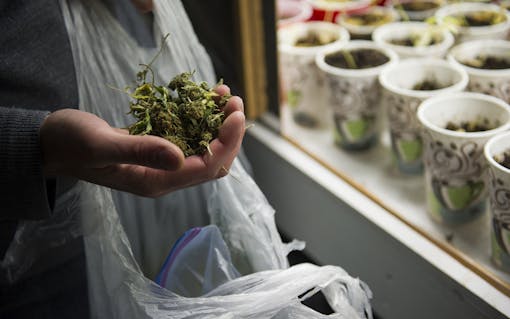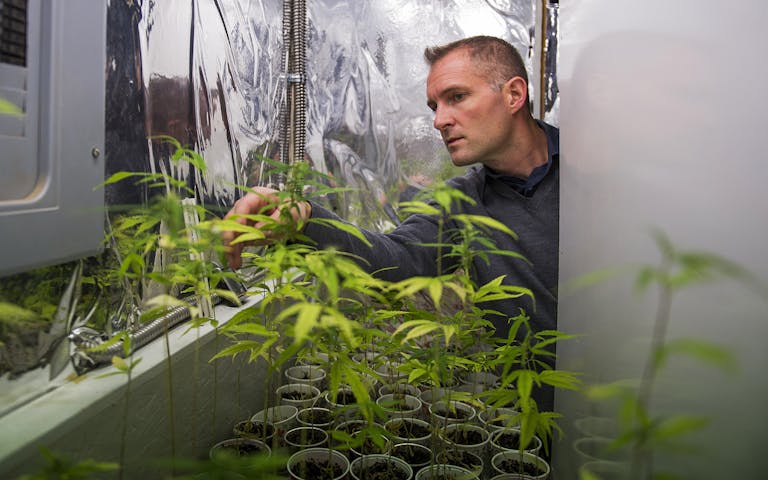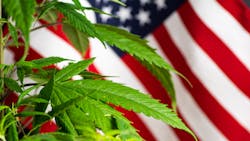In 2009, Matthew Kahl of the 101st Airborne Division returned stateside from his first combat deployment. In Afghanistan he had seen firsthand the carnage of explosions set off in crowded street markets. Back on base at Fort Campbell, Kentucky, he tried to put those memories behind him. But echoes of wartime still haunted him as he as he inched through the commissary.
He made his way through the market with his back to the aisles’ shelves, keeping a watchful eye on the bustle. Children toddled behind their mothers, sometimes squealing or crying. Kahl couldn’t stand the crying.
Then a thought hit him, coursing through his body hit him like an electric current: All of these people are going to die. His eyes darted around the fluorescent-lit store as the dread grew. I’m going to see them all die, he thought. Any minute now.
“A lot of people that have PTSD have emotional outbursts. It’s usually from a position of fear, but it can manifest as anger.”
Kahl had taken his back off the shelves just long enough to turn a corner when a man bumped into him from behind. Before Kahl knew what happened, the man was in the air. The next moment he was on the ground, sprawled on his back, looking up at Kahl incredulously.
What had transpired was still crystalizing in Kahl’s mind as he sheepishly apologized, offered his hand to help the man up, and excused himself from the store.
Kahl had just experienced a PTSD-related flashback. To this day, he doesn’t have a clear memory of what happened in the commissary. The unexpected bump from a stranger triggered combat memories, and he says his mind was transported back to the crowded Afghan markets where he had witnessed explosion after explosion.
Sitting in his parked car outside the store, he watched the military police pull up. Then he drove off.
That’s when Kahl decided to stop going out. For the sake of others, he told himself, he’d stay home. There, he found temporary relief from his unrelenting hypervigilance: alcohol and a heavy-duty regimen of military-prescribed painkillers, anti-anxiety drugs, and sleep medications. The cocktail of pills and liquor rendered Kahl incapacitated most of the time, which only added to his self-loathing.
In 2013, after two suicide attempts and near-fatal kidney and liver failure, a friend—one of few Kahl had left—suggested he try cannabis to ease his symptoms. What happened next would change the course of Kahl’s life. He would go on to lend his hand in crafting a landmark Colorado bill, SB 17, which could approve PTSD for medical cannabis patients in the state. Teetering on the edge of becoming law, it made its way through the Legislature in April and now awaits the signature of Gov. John Hickenlooper. [Editor’s note: Hickenlooper has since signed SB 17, adding PTSD as a qualifying condition in Colorado.]

Kahl sits in a makeshift grow room at his home in Divide, CO. As the founder and executive director of Veterans for Natural Rights, it’s been his goal since moving to Colorado to improve veterans’ access to cannabis. (Daniel Brenner for Leafly)
A New Hope
“I took a few hits off a joint,” Kahl said of his first time using cannabis to cope with PTSD. At first he didn’t feel much, he remembers. Then he did.
Shop highly rated dispensaries near you
Showing you dispensaries near“I noticed I was just sort of daydreaming,” he recalled, “just sort of idle thoughts, not anything alarming, none of the anxiety or the circular thought patterns that often are indicative of PTSD and hypervigilance. All that sort of went away.”
Kahl wasn’t alone. A 2014 study in the Journal of Psychoactive Drugs found that cannabis patients in New Mexico, where PTSD has long been a qualifying condition, experienced a 75% decrease in three major PTSD-related symptoms. A separate study in 2015 concluded that “substantial numbers of military veterans with PTSD,” have improved their coping ability through cannabis and experienced relief from symptoms such as anxiety and insomnia.
For someone who had been gripped for years by unrelenting anxiety and depression, the difference was astonishing. “It was like, Holy crap, man, you just had a few minutes of peace. You need to figure out how to make that happen again.”
Kahl decided commit to cannabis to help manage his PTSD. He and his wife, Aimee, moved their family to Colorado in the summer of 2014. Colorado didn’t permit treatment of PTSD with medical cannabis at the time, but because Kahl had a number of other medical conditions from injuries sustained in combat, he had no problem acquiring a doctor’s recommendation.
For other veterans, however, access was more difficult. Kahl saw friends living with PTSD, but not other ailments, who weren’t using cannabis.
“I styled myself as a bit of a cannabis evangelist,” Kahl said. He began growing his own plants and learning what strains best eased his symptoms. He cultivated extra to give away to other veterans. When it comes to treating PTSD, he said, not just any strain will do.
Anecdotal reports suggest that CBD-rich cannabis and certain terpenes and flavonoids are more beneficial than others, according Sue Sisley, the psychiatrist who spearheaded the first Food and Drug Administration-approved clinical study into how smoked cannabis affects PTSD symptoms. In other words, the high-THC strains typically available at retail stores aren’t the strains most PTSD sufferers turn to.

Regulatory Red Tape
Several earlier attempts had been made to add PTSD to Colorado’s list of qualifying conditions, but none was successful. To add a new condition, the state requires “published literature of randomized controlled trials or well-designed observational studies of human subjects.” But proponents of adding PTSD to the list say that’s an impossible standard to meet given the research roadblocks imposed on the Schedule I drug by both the FDA and Drug Enforcement Agency. The state’s high standard for data, they complain, effectively strips Coloradans of the ability to bring any such petition forward.
That doesn’t mean patients haven’t tried. The most recent of many efforts took place in July 2015, when 35 individuals gave impassioned testimony before the Board of Health. But the effort fell flat.
“While I get the humanity and certainly the cases and the anecdotal experience,” board panelist Christopher Stanley said after hearing proponents speak. “I don’t see that the evidence really allows us to be able to add this, according to our particular jurisdiction.”
The proposal failed, 6–2.
Kahl was at that meeting. He delivered testimony alongside a host of other advocates and PTSD survivors, not all of whom were veterans. He shared his story of how he found healing in cannabis. Then he joined the boos and jeers as the board voted the petition down.
To the Legislature
Something had changed for Kahl. He had been roped into the world of political advocacy. It no longer felt sufficient simply to share his harvest with a few friends anymore. Kahl’s new goal was for all veterans, and anyone suffering from PTSD, to have the ability to try medical cannabis for themselves.

Kahl and his dog, Seven, on the shore of a lake near their home in Divide, CO. (Daniel Brenner for Leafly)
As he saw it, that day in July was just a setback. “We’re veterans,” he said. “We’re used to finding a flag left in the muck and picking that flag up and carrying it home and making sure the job gets done.” After the board’s vote in 2015, “I just started rounding up vets to talk about this issue.”
He and fellow advocates, notably Teri Robnett and her husband Guy Duran as well as researcher Sisley, enlisted the Denver cannabis law firm Hoban Law Group to appeal the board’s decision. They also hatched a Plan B: If the Board of Health couldn’t be moved, the team reasoned, perhaps they could pass a law to add PTSD as a qualifying condition in Colorado.
A year later, in the summer of 2016, a golden opportunity arose. Representatives of the CDPHE Medical Marijuana Scientific Advisory Council spoke in favor of adding PTSD to Colorado’s list of qualifying conditions at a presentation to state legislators.
State Sen. Irene Aguilar (D-32), a doctor, was moved by the council’s endorsement. Following the presentation, she co-sponsored a bill to add PTSD as a qualifying condition. Last month, on April 25, Senate Bill 17 passed through the state Legislature. If Gov. John Hickenlooper signs the measure, Kahl’s dream of expanding cannabis access for veterans will finally become reality. (As of publication, Hickenlooper had not yet signed SB 17. If he fails to take any action at all, the bill will become law anyway in June. “Fingers crossed,” Kahl said via email. )
Kahl is still using cannabis to manage his PTSD symptoms. And so far, he said, he’s been able to stave off incidents like the one in the Fort Campbell commissary.
“A lot of people that have PTSD have emotional outbursts every once in a while, and it’s usually from a position of fear. But it can manifest as anger,” Kahl said. “It’s so easy to deflate that balloon and just let a little air out with cannabis—and regain some rationality.”





